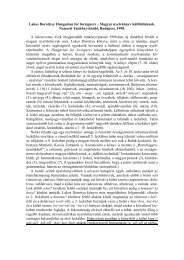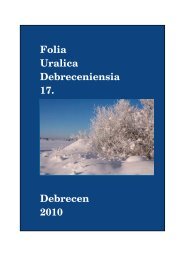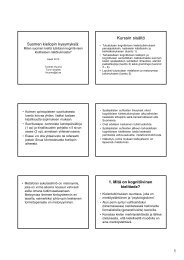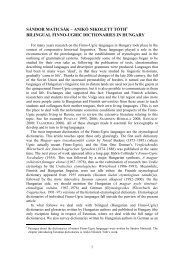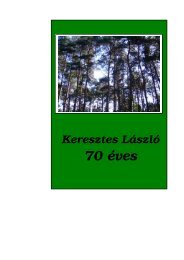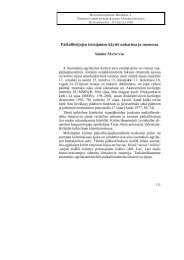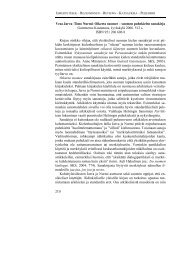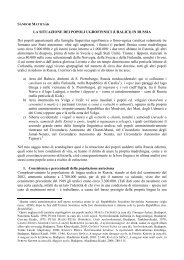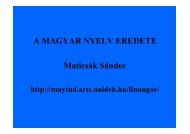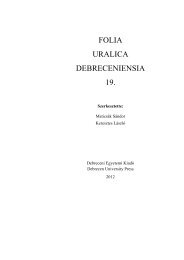Allomorphic variants of Erzya-Mordvin nominal derivational suffixes
Allomorphic variants of Erzya-Mordvin nominal derivational suffixes
Allomorphic variants of Erzya-Mordvin nominal derivational suffixes
You also want an ePaper? Increase the reach of your titles
YUMPU automatically turns print PDFs into web optimized ePapers that Google loves.
śelmukš-t (plur.) ’glasses’ ← śelme ’eye’, piľukš ’having sharp hearing; crested’ ← piľe ’ear’ (u← е). It is problematic, however, if we can consider the -akš/-ukš <strong>variants</strong> (after the deletion <strong>of</strong>the stem-final vowel) as existing forms from a descriptive point <strong>of</strong> view.3.2.3. The -vt suffix is a de<strong>nominal</strong> and deverbal, not too productive <strong>nominal</strong> suffix (Cygankin1981: 39; Mészáros 1998: 41).c) The little data found all end in a vowel: avavt ’mother-in-law’ ← ava ’woman, housewife;mother’, aťavt ’father-in-law’ ← aťa ’old man; husband’, pŕavt ’boss’ ← pŕa ’head’, or čalgavt’step’ ← čalga- ’to step’, jakavt ’walking’ ← jaka- ’to walk’, oršavt ’clothing’ ← orša- ’to getdressed’, piŕavt ’fence’ ← piŕa- ’to fence, to enclose’, vanovt ’glance’ ← vano- ’to look at’.3.3. -CCC type <strong>suffixes</strong>3.3.1. The -vks is a deverbal <strong>nominal</strong> suffix. It is productive and frequent (Bartens 1999: 107; EK36; Cygankin 1981: 39–40; 2000c: 145; Grammatika 1980: 105; Mészáros 1998: 59).c) Because this suffix forms verbs only, it is attached to verbal stems ending in a vowel, andinstances where it is added to a stem-final consonant cannot be found: aŕśevks ’idea,conception’ ← aŕśe- ’to think (about)’, artovks ’painting, drawing’ ← arto- ’to paint, to draw’,izavks ’harrowing’ ← iza- ’to harrow’, kemevks ’belief, trust’ ← keme- ’to believe’, meŕevks’expression’ ← meŕe- ’to tell’, ńevťevks ’example, specimen’ ← ńevťe- ’to show’, oršavks’clothing, garment’ ← orša- ’to get dressed’, targavks ’cigarette-end’ ← targa- ’to smoke’.3.3.2. The -kśť suffix is added to numerals to express multiplication <strong>of</strong> the given number(Grammatika 1962: 40; Grammatika 1980: 363; Mészáros 1998: 68–69).b) There are two cases when the last syllable <strong>of</strong> the stem is deleted: kavkśť ’twice’ ← kavto ’two’,veśť ’once’ ← vejke ’one’ (here the suffix itself has got a different form as well).c) It is attached to numerals ending in a vowel directly: kolmokśť ’three times’ ← kolmo ’three’,ńiľekśť ’four times’ ← ńiľe ’four’, veťekśť ’five times’ ← veťe ’five’, śadokśť ’a hundred times’← śado ’hundred’ etc.; lamokśť ’a lot <strong>of</strong> times’ ← lamo ’a lot <strong>of</strong>’, źarijakśť ’a few times’ ←źarija ’a few’. The numeral śiśem ’hét’ ends in a consonant, therefore a connective vowel isadded before the suffix (śiśemekśť), this is why, from a descriptive point <strong>of</strong> view, the suffixtakes up the -kśť, -ekśť forms.3.4. -CV type <strong>suffixes</strong>3.4.1. The -mo, -ma, -me suffix is one <strong>of</strong> the most common deverbal <strong>suffixes</strong>. It is highlyproductive and very frequent; its basic function is to create abstract nouns (Bartens 1999: 106;Cygankin 1981: 41–42; 2000c: 146–147; EK 36; Grammatika 1980: 105–106; Keresztes 1990:67; Mészáros 1998: 59; Serebrennikov 1967: 70).a) In very rare cases, the stem-final vowel may be deleted: ľiśma ’well, fountain’ ← ľiśe- ’to comeout; to creep forth’, viďme ’seed’ ← viďe- ’to sow’.c) Except for the instances given above, this suffix always connects to verbal stems ending in avowel.f) The choice between the three allomorphic <strong>variants</strong> <strong>of</strong> the suffix depends on the last vowel <strong>of</strong> thestem: verbs ending in -a get the -mo variant (kortamo ’speech; chat’ ← korta- ’to speak, totalk’, ľezdamo ’help’ ← ľezda- ’to help, to assist’, moramo ’singing’ ← mora- ’to sing’,oršamo ’clothing, garment’ ← orša- ’to get dressed’, ozamo ’chair, small seat’ ← oza- ’to sit(down)’); verbs with a stem-final -o or -e are followed by the -ma allomorph (kemema ’belief;trust’ ← keme- ’to believe; to trust’, kuloma ’death’ ← kulo- ’to die’, moľema ’going, walking’← moľe- ’to go, to walk’, pejďema ’laughter’ ← pejďe- ’to laugh’, and also mizoldoma ’smile’← mizoldo- ’to smile’, pŕadoma ’ending’ ← pŕado- ’to end, to finish’, śavadoma ’envy’ ← śa-7



